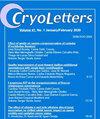Cryobiology and fertility preservation: a perspective on past, current and future studies.
IF 0.9
4区 生物学
Q3 BIOLOGY
引用次数: 0
Abstract
Cryopreservation has been used over many decades for the maintenance of viable biological specimens. Its expansion into the area of fertility preservation has been a natural outcome of the increased risks to human fertility from diseases, such as cancer and its treatment protocols, including radiation and chemo-therapy, and the general lifestyle trend to later marriages. The use of assisted reproductive techniques (ART) in preserving fertility have benefitted significantly from new scientific approaches, such as cryostorage, in which live cells and tissues are stored at low temperatures and revived when necessary. This review focuses on "cryopreservation science monitoring in reproductive biomedicine" to evaluate knowledge, trends, driving forces, impetus, and emerging technologies in order to draw a future roadmap for this field. Our analysis of the field of cryobiology emphasizes the significance of strategic planning of cryobiology research to support more its extensive use in therapeutics in the future. The Royan Institute (Tehran, Iran) recognises this need and has developed a strategic plan to engage in multidisciplinary research on the application of cryobiology, including cryobioengineering, in disease mitigation. We hoped that this study can help improve the quality and quantity of public discourse and expert awareness of the role for cryopreservation in fertility preservation within ART. DOI: 10.54680/fr23410110112.低温生物学与生育能力保存:对过去、现在和未来研究的展望。
冷冻保存已经使用了几十年,用于维持活的生物标本。它扩展到维持生育能力领域是癌症及其治疗方案(包括放射和化学疗法)等疾病对人类生育能力的风险增加以及晚婚的普遍生活方式趋势的自然结果。辅助生殖技术(ART)在保存生育能力方面的应用得益于新的科学方法,例如低温储存,其中活细胞和组织在低温下储存并在必要时复活。本文从“生殖生物医学中的低温保存科学监测”这一领域的相关知识、发展趋势、驱动力、推动力和新兴技术等方面进行综述,展望该领域的未来发展方向。我们对低温生物学领域的分析强调了低温生物学研究战略规划的重要性,以支持其在未来治疗学中的更广泛应用。Royan研究所(伊朗德黑兰)认识到这一需求,并制定了一项战略计划,以参与关于低温生物学应用的多学科研究,包括低温生物工程在减轻疾病方面的应用。我们希望这项研究可以帮助提高公众话语的质量和数量,并提高专家对低温保存在ART中保存生育能力的作用的认识。DOI: 10.54680 / fr23410110112。
本文章由计算机程序翻译,如有差异,请以英文原文为准。
求助全文
约1分钟内获得全文
求助全文
来源期刊

Cryo letters
生物-生理学
CiteScore
1.80
自引率
10.00%
发文量
50
审稿时长
1 months
期刊介绍:
A bimonthly international journal for low temperature sciences, including cryobiology, cryopreservation or vitrification of cells and tissues, chemical and physical aspects of freezing and drying, and studies involving ecology of cold environments, and cold adaptation
The journal publishes original research reports, authoritative reviews, technical developments and commissioned book reviews of studies of the effects produced by low temperatures on a wide variety of scientific and technical processes, or those involving low temperature techniques in the investigation of physical, chemical, biological and ecological problems.
 求助内容:
求助内容: 应助结果提醒方式:
应助结果提醒方式:


